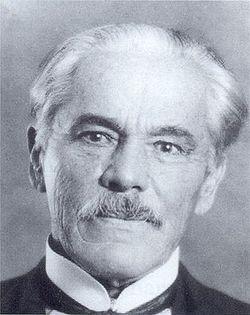Aleš Hrdlička
| Aleš Hrdlička | |
|---|---|
 |
|
| Born |
29 March 1869 Humpolec, Austria-Hungary |
| Died | 5 September 1943 (aged 74) Washington, D.C. United States |
| Education | Eclectic Medical College New York |
| Occupation | Anthropologist |
| Parent(s) | Maxmilian Hrdlička, Karolina Hrdličková |
Aleš Hrdlička (March 29, 1869 – September 5, 1943) was a Czech anthropologist who lived in the United States after his family had moved there in 1881. He was born in Humpolec, Bohemia (today in the Czech Republic) and given a baptismal name "Alois", which he later changed into a more patriotic form "Aleš".
His mother, Karolína Hrdličková, educated her gifted child herself; his skills and knowledge made it possible to skip the primary level of school. The family immigrated to the U.S. in 1881, when he was only 13. After arrival, the promised job brought only a disappointment to his father who started working in a cigar factory along with teenage Alois to earn living for the family with 6 other children. Young Hrdlička attended evening courses to improve his English, and at the age of 18, he decided to study medicine since he had suffered from tuberculosis and experienced the treatment difficulties of those times. In 1889, Hrdlička began studies at Eclectic Medical College and then continued at Homeopatic College in New York. To finish his medical studies, Hrdlička sat for exams in Baltimore in 1894. At first, he worked in the Middletown asylum for mentally affected where he learnt of anthropometry. In 1896, Hrdlička left for Paris, where he started to work as an anthropologist with other experts of then establishing field of science.
Between 1898 and 1903, during his scientific travel across America, Hrdlička became the first scientist to spot and document the theory of human colonization of the American continent from east Asia only some 3,000 years ago. He argued that the Indians migrated across the Bering Strait from Asia, supporting this theory with detailed field research of skeletal remains as well as studies of the people in Mongolia, Tibet, Siberia, Alaska, and Aleutian Islands. The findings backed up the argument which later contributed to the theory of global origin of human species that was awarded by the Thomas Henry Huxley Award in 1927.
...
Wikipedia
